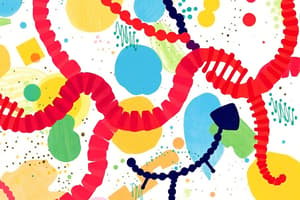Podcast
Questions and Answers
What is the primary outcome of changes in gene expression?
What is the primary outcome of changes in gene expression?
- Cell death
- Cell division
- Gene mutation
- Cell differentiation (correct)
What is the primary function of gene regulatory proteins?
What is the primary function of gene regulatory proteins?
- To translate mRNA into protein
- To control the expression of genes (correct)
- To replicate DNA
- To transcribe DNA into mRNA
What is the role of an activator protein in gene regulation?
What is the role of an activator protein in gene regulation?
- To translate mRNA into protein
- To inhibit gene expression
- To transcribe DNA into mRNA
- To stimulate gene expression (correct)
How can a single gene regulatory protein control the expression of multiple genes?
How can a single gene regulatory protein control the expression of multiple genes?
How can enhancers regulate gene expression?
How can enhancers regulate gene expression?
What is the heritable material for almost all organisms?
What is the heritable material for almost all organisms?
What is the role of the TATA Binding Protein (TBP)?
What is the role of the TATA Binding Protein (TBP)?
What is the effect of repressor proteins on gene expression?
What is the effect of repressor proteins on gene expression?
What is a characteristic of gene activator proteins?
What is a characteristic of gene activator proteins?
What is the effect of enhancers on gene expression?
What is the effect of enhancers on gene expression?
What is the role of co-activators in gene regulation?
What is the role of co-activators in gene regulation?
What is the result of the experiment by Oswald Avery and Colin Macleod?
What is the result of the experiment by Oswald Avery and Colin Macleod?
What is the role of general transcription factors in eukaryotic gene regulation?
What is the role of general transcription factors in eukaryotic gene regulation?
What is the result of the expression of the eyeless gene in eye precursor cells?
What is the result of the expression of the eyeless gene in eye precursor cells?
What is a mechanism of regulating gene expression?
What is a mechanism of regulating gene expression?
Flashcards are hidden until you start studying
Study Notes
Gene Expression and Cell Differentiation
- Changes in gene expression lead to cell differentiation
- Cell differentiation is a process where cells become specialized to perform specific functions
Gene Regulatory Proteins
- Multiple proteins control the expression of a single gene
- Gene regulatory proteins can act as activators or repressors
- Activators stimulate gene expression, while repressors inhibit it
Regulation of Multiple Genes
- A single protein can regulate the expression of multiple genes
- This allows for coordinated regulation of gene expression
Enhancers and Gene Expression
- Enhancers are DNA sequences that can looping back to genes to regulate their expression
- Experimentation can determine how enhancers regulate gene expression
DNA as Heritable Material
- In 1944, Oswald Avery and Colin Macleod conducted a famous experiment with a pathogenic bacterium that causes pneumonia, demonstrating that DNA is the heritable material.
- They found that only DNA could transform the rough R strain into S strain cells, proving that DNA carries heritable information.
Cell Differentiation and Gene Expression
- Differentiation can lead to dramatic differences in cell morphology and function due to changes in gene expression.
- Gene expression is regulated through transcription of DNA into mRNA and translation into protein.
- Cells can change gene expression patterns without altering the nucleotide sequence.
Transcription and Gene Regulation
- Genes can be transcribed with different efficiencies, controlled by protein binding to regulatory DNA sequences.
- Eukaryotic RNA polymerase requires general transcription factors, such as TATA Binding Protein (TBP), which recognizes and binds to the TATA box.
- Gene transcription is controlled by the binding of tissue-specific activator proteins (regulator or transcription factors) to gene promoters and their interaction with RNA polymerase.
- Gene activator proteins can act at different steps in the transcription process, such as promoter binding, recruiting RNA polymerase, and releasing RNA polymerase from pause.
Eukaryotic Gene Regulation
- Eukaryotic gene regulatory proteins often assemble as complexes on DNA, including co-activators or co-repressors.
- Gene control consists of a promoter and regulatory DNA sequences (enhancers), and is a complex event.
- Gene activator proteins can cause local changes in chromatin structure.
- Repressor proteins can antagonize activator proteins through competitive DNA binding, masking the activation surface, and direct interaction with general transcription factors.
Combinatorial Control and Regulation
- Combinatorial control includes competition for binding sites by regulatory proteins.
- The position of enhancers in DNA can affect whether co-operative binding occurs.
- Artificial expression of specific transcription factors can result in conversion of cell types, such as liver cells into neurons.
- The formation of an entire organ can be triggered by the expression of one gene regulatory protein, such as eyeless expression in the eye precursor cells.
Regulation of Gene Regulatory Proteins
- The activity of gene regulatory proteins can be regulated in multiple ways, including protein synthesis, ligand binding, and addition or removal of ligand.
- Examples of regulation include the tryptophan-dependent function of a repressor in bacteria and the E.Coli lac operon, where the lacZ gene is regulated by a repressor protein.
Studying That Suits You
Use AI to generate personalized quizzes and flashcards to suit your learning preferences.



